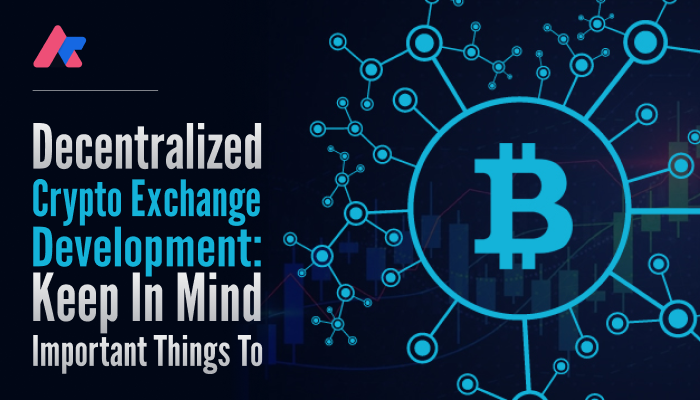
Decentralized Crypto Exchange Development: Important Things To Keep In Mind
In recent years, the emergence of cryptocurrency exchanges has seen a significant spike in popularity. Decentralized assets are becoming more popular, and more organizations are vying to provide the best crypto exchange. It might be difficult to choose the right cryptocurrency exchange technology because there are so many options. While setting up a decentralized exchange development company, entrepreneurs should keep a few key considerations in mind in order to achieve a competitive advantage.
To assist you with decentralized exchange development, we’ve compiled a list of critical factors to consider for increased usability, productivity, and future scalability.
Decentralized Exchange (DEX): An Overview
DEXs are essentially peer-to-peer marketplaces, similar to stock exchanges, where crypto dealers may conduct direct transactions. It was established to eliminate the need for any authority to supervise or authorize transactions on the platform. P2P cryptocurrency trading is made possible through DEXs, which connect buyers and sellers of digital assets.
Decentralized exchanges are notable for the fact that they do not delegate the administration of your assets to other parties such as regulators or middlemen. Smart contracts, which are essentially code-specified self-executing agreements, can be used by DEXs to assure transactions.
Aside from the fact that they are non-custodial in structure, crypto exchange development services allow users to retain ownership and control of their secret keys. As a result, DEXs have been increasingly popular in recent years because of their benefits. Even more importantly, the fundamentals of decentralized exchange development must be investigated to recognize their true scope.
How Decentralized Exchange Works
A decentralized exchange’s capabilities can only be fully appreciated if we understand how it operates. The operation of a DEX is highly dependent on its architecture. Thus, by examining the many types of designs of DEX, you may learn a great deal about how DEXs function.
Let us examine the various forms of DEX exchanges in detail to understand how they function.
Automated Market Makers or AMMs
The Automated Market Maker technology uses smart contracts to solve the liquidity issue. AMMs rely on blockchain-based services to collect data from marketplaces and other platforms and use it to determine the value of traded assets. Decentralized exchanges based on AMM might use liquidity pools instead of combining buy and sell orders. A key function of AMM-based DEXs is the use of liquidity pools, which are essentially pre-funded collections of assets.
Liquidity pools benefit from the contributions of users, who are compensated with transaction fees allocated to transactions on the relevant currency pair. In order to make money with liquidity mining, these users, who are called “liquidity providers,” must invest the equivalent value of each commodity in a trading pair. Traders can execute orders using liquidity pools in an AMM-based decentralized exchange.
Order Book DEXs
As one of the early models for decentralized exchanges, the order book is a prominent one. Order books keep track of all open orders for the purchase and sale of assets for specified asset pairings. According to the terms of the purchase orders, traders are interested in bidding on an item at a specific price. However, a sell order indicates that the trader is ready to sell or ask for a specified price for the item. The depth of the order book and the market price of the asset are both determined by the price disparity.
On-chain and off-chain order books may be found on the DEX cryptocurrency exchange. On-chain order book DEXs are DEXs that store open order details on the chain. DEXs might assist traders to strengthen their holdings by allowing them to borrow money from other traders on the platform.
The possibility of liquidity problems is a major consideration when using an order book decentralized exchange (DEX). On-chain transactions are often charged an extra cost by order book DEXs, which compete with centralized exchanges. While off-chain order book DEXs can lower expenses, there are vulnerabilities associated with smart contracts.
DEX Aggregators
A decentralized exchange list would not be complete without a decentralized exchange aggregator. Their primary function is to source and route liquidity across various DEXs in accordance with predetermined criteria.
Decentralized exchanges don’t have to rely on their own pools of liquidity when serving traders. DEX aggregators have the potential to transform the way crypto traders conduct business.
The Advantages of Using DEXs
In recent years, decentralized cryptocurrency exchanges have emerged as one of the most promising paths for cryptocurrency trading. The following are some benefits that may be found with nearly every listing on a decentralized exchange list:
Supply of Tokens
Tokens issued on the same blockchain as the decentralized exchange can be more easily obtained through these exchanges. As a consequence, new projects would offer their coins on these exchanges in addition to the centralized exchanges.
Anonymity
The anonymity of users is yet another significant benefit of decentralized exchanges. With decentralized crypto exchanges, users don’t have to go through the conventional KYC or Know Your Customer standards.
Lowering the Risk to Others
If one of the parties participating in a transaction fails to meet their contractual obligations, counterparty risk is obvious. Using smart contracts, decentralized exchanges (DEXs) can ease transactions. Consequently, there is no need for a middleman to facilitate transactions, allowing you to avoid counterparty concerns.
Enhanced Security
A DEX, or decentralized exchange, has the distinct advantage of not having control over the assets of its consumers. Instead, traders have full control over their funds and may interact with the DEX in any way that suits their wants and requirements.
The Risks Associated with the Use of DEXs
Aside from all of the benefits of decentralized exchanges, the following concerns must also be taken into consideration.
Knowledge of a Particular Subject Matter
Customers using a DEX crypto exchange should be familiar with basic security fundamentals. Additional information is required in regards to wallet selection and token funding, as well as a thorough understanding of the cryptocurrency market.
Token Listings That Are Not Verified
Decentralized crypto exchanges allow anybody to issue a new token with the goal of increasing liquidity. Investors, on the other hand, are at risk of being conned out of their money. Thus, investors may buy tokens under the mistaken belief that they are purchasing another token. As a result, before investing money in a token, traders should exercise caution and do their research.
Risks of Smart Contracts
Among the vulnerabilities of a DEX exchange, smart contract risks would be the final ones to address. It’s possible that defects in smart contracts that might be exploited could go undetected, resulting in more harm.
Things to Keep in Mind Before Establishing a Decentralized Exchange
- Easy-To-Use User Interface
Most organizations, although designing the most modern cryptocurrency exchange, tend to forget the necessity of a user-friendly interface. A good user experience (UX) will always make it easier for people to use any type of online portal. Remember that you’re developing your platform for both newbies and veterans alike.
There are several ways to keep the cryptocurrency exchange clutter-free while yet providing all of the advanced trading options you can. When creating a new trading platform, it is essential that the developers make it so that users can simply discover and use the features they require. With the rise of mobile trading, you need to make sure your platform is mobile-friendly as well.
- The User Management Module
A specialized dashboard for managing users and the exchange is necessary for running a crypto exchange effectively. With a single dashboard, you can manage everything from KYC, AML, client management, and application optimization.
Customers must be able to make simple changes to their profile, such as changing their contact information or email address. It’s essential because if users are unable to access the system, the administrator’s workload would be increased significantly. Whether it’s the ability to check trading history, manage funds, or modify personal information, investors always want accessibility to these fundamental features.
- Setting up a Secure Environment
Privacy and security of the users should be the top priority of any decentralized exchange platform. Having a huge amount of wealth and crypto assets stored on the crypto platforms means that company owners can’t leave anything to chance. Multi-layered security is the best way to keep the platform safe and secure. Additionally, developers should work on incorporating sophisticated security features, such as HTTPS integration, KYC, and AML.
Professional developers must incorporate a variety of additional security mechanisms to safeguard the entire ecosystem. Secure wallet integration and anti-DDoS modules should be considered while creating a crypto exchange’s domain name security extensions and X frame choices.
- Login Security with Multiple Layers
The majority of cyber-attacks begin with a penetration of the login module using the SQL injection and other trespassing techniques. It’s imperative to keep your platform safe from any fraudulent logins or signups. The system must be able to detect and prevent fraudulent login attempts.
Adding two-factor authentication (2FA) as an extra layer of protection will remove the possibility of gaining access to the system by stealing or hacking passwords. Enforcing 2FA for all users is a good way to keep your platform safe. Encourage your clients to maintain their passwords up to date at all times in order to avoid any potential cyber threats.
- Support for a Variety of Cryptocurrencies
Since cryptocurrencies are so widely used, it’s critical that your platform offers a wide variety of them. In addition to Bitcoin, Ethereum, LTC, and XTC, there are a number of additional cryptocurrencies which are regularly traded.
The most popular cryptocurrency among your customers should be included in your platform, thus you should do market research to discover this information. Always keep future scalability in mind while building the exchange, so that you may add support for more coins with less delay in the future.
- Integration of APIs
Your bitcoin trading platform should include API integration as a valuable feature. It enables greater flexibility and freedom in terms of integrating various services and providing a better user experience. Numerous beneficial features are accessible as open-source software. API integration enables you to quickly provide these services to your consumers and grow your platform’s user base.
Using open-source third-party APIs, you may also deliver real-time market information to your clients. Making your platform future-proof and adaptable to new developments is made easier with this capability.
To Conclude
An in-depth understanding of blockchain technology and other crypto-related technologies is required for the creation of a reliable decentralized cryptocurrency platform. You should also take into account the unique characteristics of the cryptocurrency industry, demands of your target audience, and pay special attention to the platform’s security features.
Zahir Khan
Zahir is the Head of Digital Marketing at Appinop Technologies with expertise in blockchain content writing and designing. He loves to read and write about new technologies like Blockchain, Web 3.0, Meta-verse, etc. In his spare time, he enjoys watching reels of cats and dogs.








